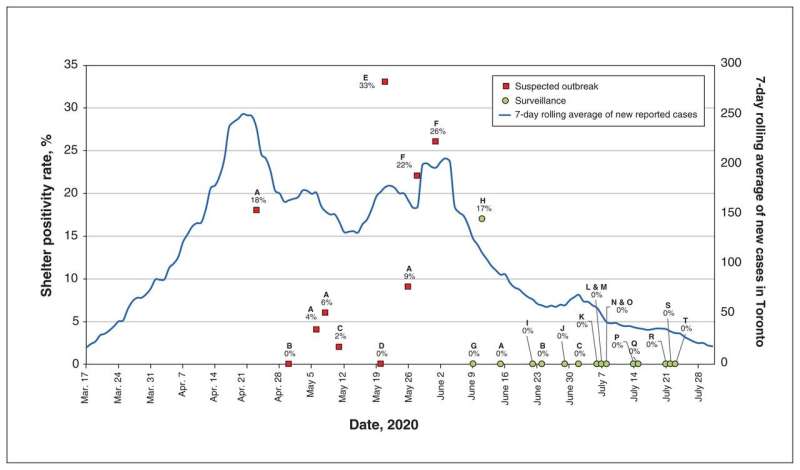Study suggests more robust testing strategy needed to prevent COVID-19 outbreaks at homeless shelters

A study that tested individuals living at shelters for COVID-19 found that among those who tested positive for the SARS-CoV-2 virus, less than 15 percent had symptoms, suggesting expanded testing of asymptomatic individuals could help stop the spread in shelter settings.
The study, which analyzed 1,000 COVID-19 tests from 20 different shelter locations in Canada’s largest city and published in CMAJ Open, also highlights how people experiencing homelessness and living in congregate settings such as shelters are at increased risk of acquiring COVID-19 and spreading it to others.
In its mobile outreach testing in the first wave, St. Michael’s Hospital of Unity Health Toronto conducted 1,000 COVID-19 tests for 872 unique shelter residents at 20 different shelter locations from April 1 to July 31, 2020. Approximately half of the tests conducted were because of an outbreak (defined as one or more cases of COVID-19 in a congregate living facility), and the other half of tests were conducted as surveillance (defined as conducting broad testing when there is no known positive case in the congregate living facility).
A total of 78 shelter residents were positive for the SARS-CoV-2 virus, and among those less than 15 percent had symptoms. Of 504 tests conducted when there was one or more case of COVID-19 in the shelter, 14 percent of tests were positive for the virus. Even when there was no known positive case in the shelters, the researchers found 2 percent of the 496 tests taken of asymptomatic individuals came back positive.
“We found that there is significant asymptomatic spread of COVID-19 in homeless shelters. When a positive case is detected, we need to test the other residents right away because there is a good chance many of them will also have been infected,” said Dr. Tara Kiran, lead researcher on the study and a family physician at St. Michael’s Hospital of Unity Health Toronto.
At the direction of the local public health unit and the regional health authority, mobile outreach testing was done by the St. Michael’s team at 20 unique shelter locations between April 1 and July 31, 2020. Testing at shelters was paused in August 2020, a change that the authors say created missed opportunities to catch asymptomatic COVID-19 cases among shelter residents and prevent outbreaks. As of March 28, there are 16 COVID-19 outbreaks at Toronto shelters and congregate living settings.
“Our study reinforces the need for efficient, routine testing in shelters to detect COVID-19 among people without symptoms. Regular use of rapid antigen tests in shelters may be one way to catch COVID-19 cases early, before they become a problem. This is particularly important until we have vaccinated the shelter population,” said Dr. Kiran, who is also a scientist with MAP Centre for Urban Health Solutions in the Li Ka Shing Knowledge Institute of St. Michael’s Hospital.
Source: Read Full Article


